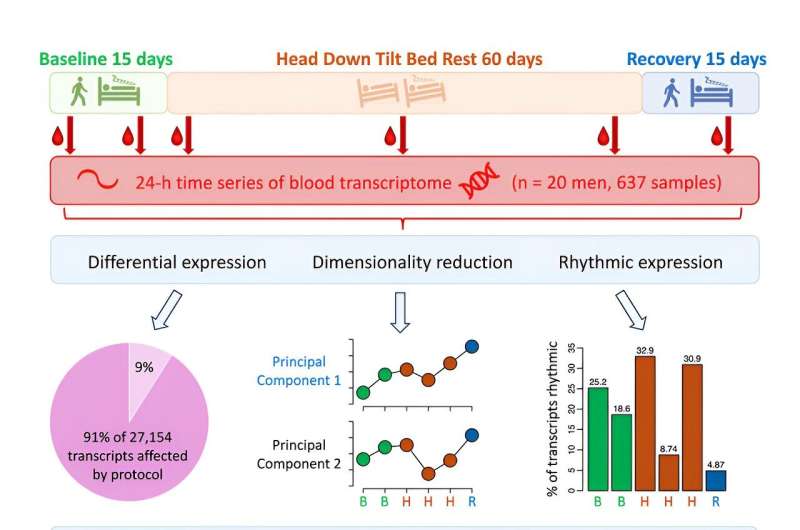This article has been reviewed according to Science X's editorial process and policies. Editors have highlighted the following attributes while ensuring the content's credibility:
fact-checked
peer-reviewed publication
trusted source
proofread
Microgravity found to cause marked changes in gene expression rhythms in humans

Simulated effects of microgravity, created by 60 days of constant bed rest, severely disrupts rhythmic gene expression in humans, according to a new study from the University of Surrey published in iScience.
Astronauts exposed to microgravity experience changes to physiology, including immune suppression, increased inflammation, and reduced muscle mass and bone density. With the increase in human spaceflight, it is important to understand changes in the molecular mechanisms underlying these changes.
Lead author Professor Simon Archer, Professor of Molecular Biology of Sleep at the University of Surrey, said, "This unique study represents the largest longitudinal dataset of time series gene expression in humans. Human gene expression varies rhythmically over the 24-hour day, and it is important to collect time series data rather than from just single time points to get a full picture of what occurs in the body when exposed to simulated microgravity.
"It also raises questions about the impact of constant bed rest on our bodies as we have identified a dramatic effect on the temporal organization of human gene expression."
In a study coordinated by the European Space Agency at the MEDES space clinic in Toulouse, 20 men completed a 90-day protocol consisting of two weeks of baseline before 60 days of constant bed rest at a -six-degree head-down tilt angle to simulate the effects of microgravity experienced by astronauts. The protocol concluded with two weeks of recovery.
The research team analyzed gene expression over a 24-hour time series during two days in baseline, three days in bed rest, and once in recovery. The results showed that 91% of gene expression was affected by the protocol, with major disruption to the number, timing, and amplitude of rhythmic genes, which display changes in their mRNA every 24 hours.
Disrupted gene expression is associated with protein translation, immune and inflammatory processes, and decreased muscle function. During the recovery period, disruption to muscle function was restored; however, lasting effects were identified with protein translation.
Senior author Professor Derk-Jan Dijk, Professor of Sleep and Physiology and Director of the Surrey Sleep Research Center, said, "Space travel was once thought to be unachievable; however, the growth of the space industry means it is now a real possibility. A lot remains unknown about the impact of microgravity on the body, and it is important we know more about this before we start 'holidaying' in space.
"Building on what we have found, the second part of our study, using the same cohort of men, will investigate the impact microgravity has on sleep, circadian rhythms and hormones of individuals."
Professor Keith Ryden, Professor of Space Engineering and Director of the Surrey Space Center, said, "Human spaceflight is very much on the agenda again with astronauts soon returning to the moon via NASA's Artemis project alongside the growth of space tourism. In addition, new plans are in place for a U.K. astronaut going to the ISS in 2025 via the UKSA Axiom program.
"It is great to see that with this new publication, the University of Surrey, well-known for its space research, is laying foundations for how to better manage the impact of the space environment on space travelers and ensure their safety."
More information: Simon N. Archer et al, Extensive dynamic changes in the human transcriptome and its circadian organization during prolonged bed rest, iScience (2024). DOI: 10.1016/j.isci.2024.109331
Journal information: iScience
Provided by University of Surrey





















